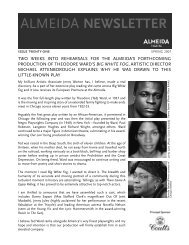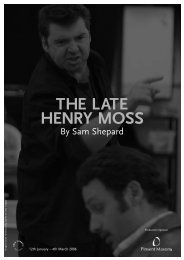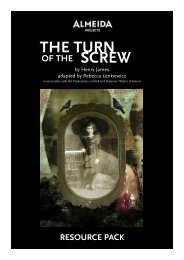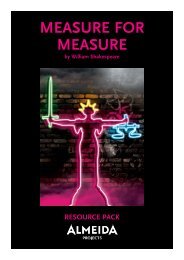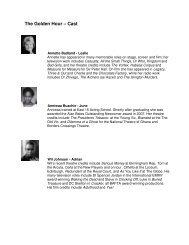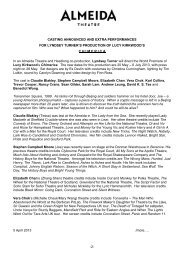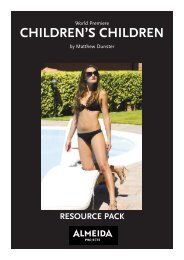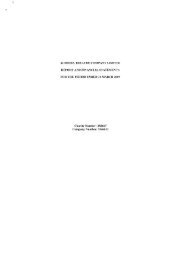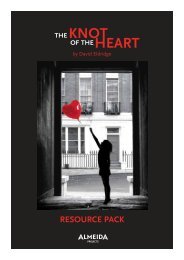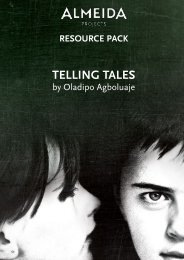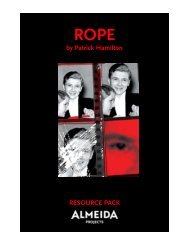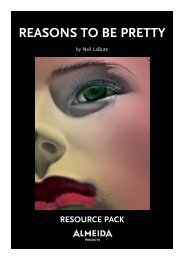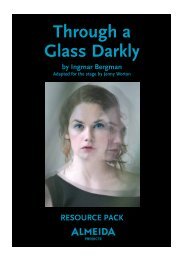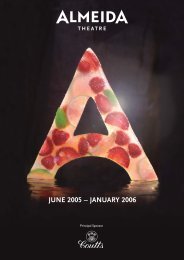When the Rain Stops Falling - Almeida Theatre
When the Rain Stops Falling - Almeida Theatre
When the Rain Stops Falling - Almeida Theatre
You also want an ePaper? Increase the reach of your titles
YUMPU automatically turns print PDFs into web optimized ePapers that Google loves.
The play deals with a number of issues that are particularly interesting to explorein <strong>the</strong> classroom. Below are just a few pointers for discussion and some practicalexercises.nature vsnurturegenerationsidentityTHEMES CLOUDunderstanding ourpast helps us to knowourselves todayabandonmentbetrayalwhat we inheritfrom our familiesregretExercise 1: Inheritance (20 minutes)Group sit in a circle. Go round <strong>the</strong> circle and member of <strong>the</strong> group in turn show, with a physical action,something <strong>the</strong>y have inherited from <strong>the</strong>ir parents (this could be an object or a physical attribute).Go round again, this time using an action to tell us something you would like to pass on to future generations(again this could be an object/physical attribute)Relate this to <strong>the</strong> seven objects from <strong>the</strong> play:* piece of driftwood* boy’s shoe* urn containing Gabriel Law’s ashes* book by Diderot (Encyclopedie au Dictionnaire Raisonne Des Sciences, Des Arts et Des Metiers)* hat* letters* notebook* postcardsPractical ExercisesDiscussionWho do <strong>the</strong>se objects belong to in <strong>the</strong> play? What is <strong>the</strong>ir significance to <strong>the</strong> giver? To <strong>the</strong> recipient? If you hadto pass on one object of significance from your life, what would it be?2: Improvisation on a Theme (20 minutes + sharing time)Divide <strong>the</strong> class into groups of three or four. Continuing <strong>the</strong> idea that our present can only be explained by ourpast, ask groups to create a short scene where an object/attribute is passed on. The object could be one chosenby a member of each group from <strong>the</strong> previous exercise, one of <strong>the</strong> listed items from <strong>When</strong> <strong>the</strong> <strong>Rain</strong> <strong>Stops</strong><strong>Falling</strong>, or something completely new. How is it passed on? Is it given to <strong>the</strong>m in a ceremony (e.g. a house/your religion) is it positive/ negative (e.g. could be a disease that you’ve passed on) Is it a secret?Share <strong>the</strong> improvisations back to <strong>the</strong> group.DiscussionHow does Gabriel York come to be in possession of <strong>the</strong> objects of his history? Look out for this during <strong>the</strong>performance. How do <strong>the</strong> objects in your improvisations get passed on and received? Are <strong>the</strong>re any similarities?3: Theatricality (20 minutes)Whole group brainstorm: <strong>the</strong> play has characters from different time periods and geographical locations, oftenonstage at <strong>the</strong> same time. How could you make that clear to <strong>the</strong> audience? What techniques could you use?Consider how you would show us different time periods on stage, with characters from different times andplaces and having <strong>the</strong>m onstage at <strong>the</strong> same time. Do <strong>the</strong>y communicate? If so, how do <strong>the</strong>y communicate?What effect does that have?<strong>Almeida</strong> Projects: <strong>When</strong> <strong>the</strong> <strong>Rain</strong> <strong>Stops</strong> <strong>Falling</strong> by Andrew Bovell26



